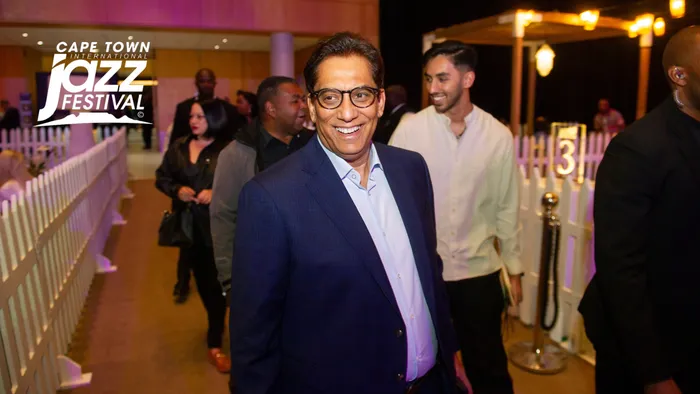Cape Town International Jazz Festival: Overcoming Gayton McKenzie's funding cuts to save 3,000 jobs

The Cape Town International Jazz Festival faces a crisis as funding cuts threaten 3,000 jobs, prompting urgent calls for government support.
Image: Armand Hough / Independent Newspapers
After some festivals were told they would no longer get government funding, organisers said they were left struggling to keep the show on the road.
Flagship festivals across SA, including the Cape Town International Jazz Festival, said they had been left in the lurch by Minister Gayton McKenzie's national sports, arts and culture department’s cuts.
Earlier this year, some organisations were notified that the Provincial Flagship Programme had been disbanded and were told they would no longer receive funding.
And so severe was the decision that 3,000 jobs were suddenly on the chopping block at the Cape Town International Jazz Festival.
But the festival says it saved the day by dipping into its own pockets.
"It really doesn’t make any sense what the minister has done," festival owner Dr Iqbal Survé said.
"We were told last year already that the minister was not going to fund any of the previous festivals that were supported by DAC.
"Instead the minister said he was going to change the funding to what he called smaller entities throughout the country on the basis of — which sounds good at face value — empowering new entrants into the industry."
But Survé said that did not happen.
He said had it not been for the "philanthropic arm of his family" 3,000 people would have been without jobs.
"Because if our family did not assist financially, the festival would effectively have shut down."
The decision grabbed headlines again this week after it was brought up in parliament.
According to figures the DA presented to MPs on Tuesday, the Cape Town International Jazz Festival generates around R900m for the Western Cape economy, supporting over 5,000 jobs.
The Klein Karoo Nasionale Kunstefees attracts more than 100,000 attendees annually, generating R72m in direct impact for Oudtshoorn and R178m across the province.
Stellenbosch Woordfees reaches over 250,000 schools and 270,000 learners annually.
Suidoosterfees sustains more than 4,000 jobs and hosts a junior festival for 8,000 schoolchildren.
Other festivals were equally significant.
Aardklop generates R50m to R65m annually for the North West and Innibos injects R80m to R90m into Mpumalanga’s economy.
Vryfees generates an estimated R208m for the Free State, and the National Arts Festival in Makhanda features 2,000 performers, attracts over 200,000 attendees, and contributes R350m annually to the local economy.
The Open Book Festival, previously a provincial flagship project, received R500,000 annually and R700,000 in 2024, totaling R2.2m over the years. It was discontinued as the department redirected resources to other initiatives.
Cape Town Carnival CEO Jay Douwes said the withdrawal was devastating.
“The Carnival has served as a flagship event for 15 years. Departmental funding has never been our sole source, but it has been crucial for sustainability and public endorsement of our work,” she said.
Douwes added that the Carnival creates approximately 1,000 paid opportunities each year for artists, artisans, technicians, facilitators, and seasonal staff.
It supports over 280 SMMEs, spending around 40% of its budget directly on local businesses and 39% on employment. Over 1,500 participants, mostly youth, gain skills, exposure, and confidence, she said.
Survé agreed with Douwes.

Were it not for the philanthropic arm of Dr. Iqbal Survé's empire, around 3,000 people involved in the Cape Town International Jazz Festival would have been left without jobs.
Image: Armand Hough / Independent Newspapers
"I think the minister, as I said, is ill-advised — whoever has advised him — and I think the minister needs to call together the organisers of all of these large festivals," he said.
"The minister needs to sit with everybody and say, 'Look, how do we support these flagship projects?'
"We’re not asking government to support it fully, right? But to provide some support — the bulk of it, in any event, is provided through the private sector and, in our case, philanthropy — but government has to provide some support.
"Every single major festival in the world — you take New Orleans, for example — is supported by the governments of those cities.
"How is it that we don’t have any support from our national government? It is just despicable that this is the case."
He said the Western Cape government was "extremely helpful".
"Look, I think that they have the capacity to do more, but I think they’re limited by what they can do," Survé said.
"However, I must say that the regional — I mean, the Western Cape MEC for arts and culture, Ricardo McKenzie — has been fantastic in his approach and support for the festival.
"He has gone out of his way to introduce people to the festival, bring linkages to the festival, and he’s done incredibly well.
"I mean, he’s limited by his budget capacity, and that’s understandable. Of course, we wish that he would provide more funding, but we truly appreciate the fact that he really does make a positive contribution."
Mackenzie said the provincial government was “perturbed” by the cuts.
“While the national department focuses on new festivals, the Western Cape has already invested in a pipeline of emerging and smaller events to grow them into flagship status,” he said.
Mackenzie said the province remained committed to established festivals, including the Cape Town International Jazz Festival, Cape Town Carnival, Suidoosterfees, and the Open Book Festival.
IOL News